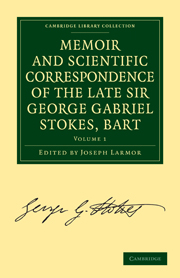 Memoir and Scientific Correspondence of the Late Sir George Gabriel Stokes, Bart.
Memoir and Scientific Correspondence of the Late Sir George Gabriel Stokes, Bart. Book contents
- Frontmatter
- PREFACE
- ADDENDA AND COEEIGENDA
- Contents
- Section I PERSONAL AND BIOGRAPHICAL. By Mrs LAURENCE HUMPHRY
- Notes and Recollections
- Early letters to LADY STOKES
- Letters on Science and Religion to A. H. TABRUM
- Appreciations by Colleagues
- Biographical Table
- Section II GENERAL SCIENTIFIC CAREER
- Section IIIA SPECIAL SCIENTIFIC COREESPONDENCE
- Appendix: JUBILEE ADDRESSES OF CONGRATULATION
- Index to Vol. I
- Plate section
Letters on Science and Religion to A. H. TABRUM
Published online by Cambridge University Press: 07 September 2010
- Frontmatter
- PREFACE
- ADDENDA AND COEEIGENDA
- Contents
- Section I PERSONAL AND BIOGRAPHICAL. By Mrs LAURENCE HUMPHRY
- Notes and Recollections
- Early letters to LADY STOKES
- Letters on Science and Religion to A. H. TABRUM
- Appreciations by Colleagues
- Biographical Table
- Section II GENERAL SCIENTIFIC CAREER
- Section IIIA SPECIAL SCIENTIFIC COREESPONDENCE
- Appendix: JUBILEE ADDRESSES OF CONGRATULATION
- Index to Vol. I
- Plate section
Summary
Lensfield Cottage, Cambridge,
Jan.16th, 1895.
Sir,
I can reply at once, and with much pleasure, to your enquiries.
(1) As to the statement that “recent scientific research has shown the Bible and religion to be untrue,” the answer I should give is simply that the statement is altogether untrue. I know of no sound conclusions of science that are opposed to the Christian religion. There may be wild scientific conjectures put forward by some, chiefly those whose science is only at secondhand, as if they were well-established scientific conclusions, and which may be of such a nature as to involve, on the assumption that they are true, certain religious difficulties; I would not go so far as to speak of opposition, as for the most part religion and science move on such different lines that there is hardly opportunity for opposition.
But if an appearance of opposition may sometimes arise from this cause, it far oftener, I think, arises from the errors of defenders of the faith once delivered to the saints, in putting forward propositions which are mere human accretions to it, and presenting the two as if they had equal claims to acceptance. When I speak of the errors of defenders of the faith I am not thinking of learned theologians of the present day, but rather of those of a bygone age, from whom these human accretions passed into the popular theology, and were supposed to be involved in the Christian faith. This mistaken belief afforded infidels a handle for attacking the faith through the error involved in some of the accretions to it.
- Type
- Chapter
- Information
- Memoir and Scientific Correspondence of the Late Sir George Gabriel Stokes, Bart.Selected and Arranged by Joseph Larmor, pp. 76 - 90Publisher: Cambridge University PressPrint publication year: 2010First published in: 1907


